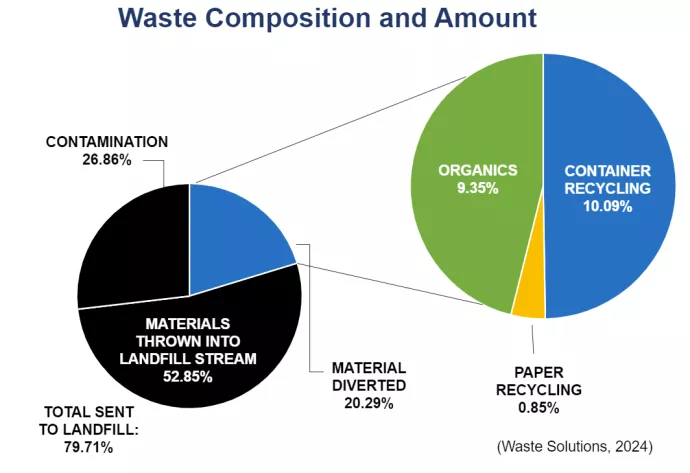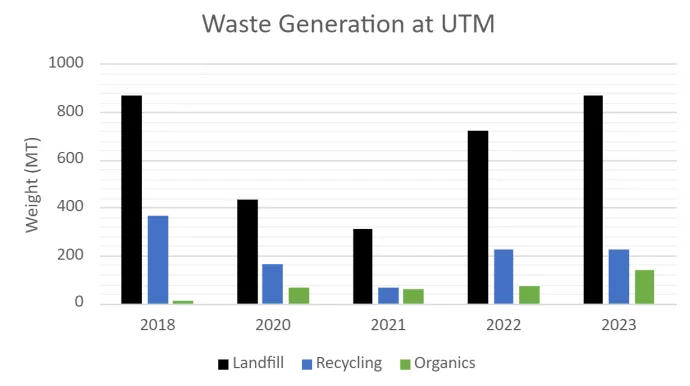Background
As an educational institution in Ontario, UTM is required by the law (O. Reg 102/94) to conduct annual waste audits. UTM works with an external auditor to complete the audit.
The auditor provides a report with quantifiable data (e.g. contamination rate, diversion rate) and qualitative information including a work plan which outlines recommendations to improve waste management practices. The work plan must be published and made available to all UTM employees.
Audit Data
Waste Diversion
Waste Generation Over the Years


Note. Figure 1. represents data from a 24-hour audit sample. This data was captured from the 4-1 hallway and eatery bins located across UTM. Therefore, other streams collected on campus, such as e-waste and yard waste, were not included. This sample provides us with data on how well the UTM community sorts their common waste daily and advises actions UTM must take to reach our waste diversion and reduction goals.
Figure 2. represents total annual landfill, recycling, and organics collected at UTM, including residences. Data includes the following (but not limited to) waste streams: Region of Peel waste and recycling, yard waste, scrap wood, metal, e-waste, textbooks, etc.
UTM's Commitment to Waste Diversion and Reduction
UTM is committed to reducing waste on campus and achieving a higher waste diversion rate. Guided by the Sustainability Strategic Plan, we will address waste challenges through education, engagement, and operations as outlined in Goals 5.13 and 5.14.
We acknowledge the behavioral and operational challenges associated with waste management on campus and will continue to implement initiatives to reduce our waste impact on the environment.
Waste Audit Work Plan
The below recommendations include results from the annual waste audit, combined with our Tri-campus Waste Reduction Working Group priorities to divert and reduce waste on campus.
- Nurture a sustainable waste management culture at UTM by educating the community on their vital role in waste management on campus through internal updates, constant monitoring of current waste initiatives, and continuous education programming
- Develop specific education around source separation of food waste which is our largest opportunity to increase our waste diversion rate as identified in the 2024 waste audit report
- Administer the Sustainability Ambassador Program where student volunteers interested in waste can participate in education opportunities (e.g. bin patrolling, tabling, event planning) to engage their peers on waste management
- Continually update the Sustainability Office website so the UTM community has the latest and most accurate information on waste initiatives on campus
How You Can Contribute to Waste Diversion on Campus

- Don't know where an item goes? Scroll through our waste training manual.
- Want to be more involved with sustainability on campus and meet like-minded students? Join the Sustainability Ambassador Program!
- Reduce your food waste by taking advantage of the OZZI and BYOC programs.
Have suggestions or ideas on how to improve waste diversion on campus? Email sustainability.fmp@utoronto.ca and let us know!
